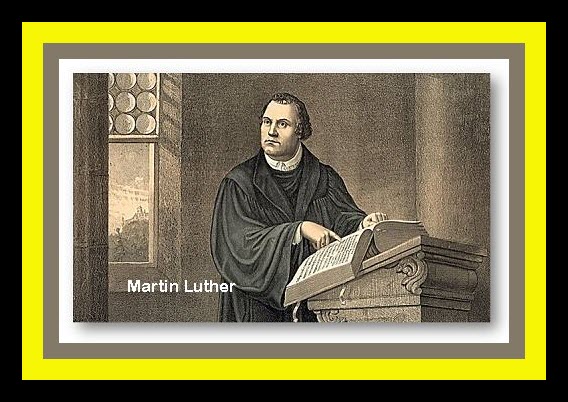


In each of the following ten choices,
mark either (a) or (b), whichever is correct. The answers are given at
the end
of this article.
(b) God
give a man right standing with
himself, by actually making him into an innocent and virtuous person.
(b) God give a
man right standing with
himself, by putting Christ’s goodness and virtue into his heart.
4.
(a)
If a Christian becomes “born again” (regenerate, transformed in
character), he
will achieve right standing with God.
(b) If the
sinner accepts right standing
with God by faith, he will then experience transformation in character.
(b) We receive
right standing with God by faith which has become active by love.
6. (a) We achieve right standing with
God, by having Christ live out His life of obedience in us.
(b) We achieve
right standing with God, by accepting the fact that he obeyed the law
perfectly
for us.
(b)
We follow Christ’s example, because
his life has given us right standing with God.
(b)
God sends his Spirit to make us good, and then He will pronounce that
we are
good.
(b)
It is the indwelling Christ that
gives us favour in God’s sight.
(b)
By the power of the Holy Spirit
living in us, we can fully satisfy the claims of the Ten Commandments.
ROMAN CATHOLICISM DOES AFFIRM SALVATION “BY GRACE ALONE”
It comes as a surprise to many
Christians that Rome will freely quote from the Bible on the matter of
salvation by grace and agree with the New Testament writers on the
following:
Being justified freely by his grace
through the redemption that is in Christ Jesus: (Rom 3:24)
…a man is justified by faith without
the deeds of the law. (Rom 3:28)
Knowing that a man is not justified by
the works of the law, but by the faith of Jesus Christ, even we have
believed
in Jesus Christ, that we might be justified by the faith of Christ, and
not by
the works of the law: for by the works of the law shall no flesh be
justified.
(Galatians 2:16)
I am crucified with Christ:
nevertheless I live; yet not I, but Christ liveth in me: and the life
which I
now live in the flesh I live by the faith of the Son of God, who loved
me, and
gave himself for me. (Galatians 2:20)
For by grace are ye saved through
faith; and that not of yourselves: it is the gift of God: Not of works,
lest
any man should boast. (Ephesians 2:8-9)
Not by works of righteousness which we have done, but according to his mercy he saved us, by the washing of regeneration, and renewing of the Holy Ghost; Which he shed on us abundantly through Jesus Christ our Saviour; that being justified by his grace, we should be made heirs according to the hope of eternal life. (Titus 3:5-7)
In his Doctrinal Catechism, Stephen
Keenan makes this startling
presentation:
“Q. What
is justification?
A. It is a grace which makes us friends
of God.
Q. Can a sinner
merit this justifying grace?
A. No, he cannot; because all the good
works that the sinner performs whilst he is in a state of mortal sin,
are dead works, which have no merit
sufficient to justify.
Q. Is it an article
of the Catholic faith, that the sinner, in mortal sin, cannot merit the
grace
of justification?
A. Yes; it is decreed in the 7th
chapter of the 6th session of the Council of Trent, that
neither
faith nor good works, preceding justification, can merit the grace of
justification.
Q. How then is a
sinner justified?
A. He is justified gratuitously by the
pure mercy of God, not on account of his own or nay human merit, but
purely
through the merits of Jesus Christ; for Jesus Christ is our
only mediator of redemption, who
alone, by his passion and death, has reconciled us to his Father.
Q. Why then do
Protestants charge you with believing that the sinner can merit the
remission
of his sins?
A. Their ignorance of the Catholic
doctrine is the cause of this, as well as many other false charges.”
WHAT IS ROME’S JUSTIFICATION?
In the words of their own apologists,
Rome’s doctrine of justification is “the heart of Catholic teaching.”
Without
question, the church teaches that justification is by an act of God’s
grace.
Stephan Keenan has a point when he says that Protestants often show
their
ignorance of Catholic doctrine.
Rome does not teach, and never has
officially taught, that justification is anything else than God’s
gracious act.
Those who imagine that Catholic
theologians teach a bald righteousness by man’s own works, are not
prepared to
meet or recognize the doctrine of the mystery of iniquity.
In brief, Catholicism teaches that
justification is God’s renovating act within man. Without this
new
birth, or regenerating act of the Holy Spirit, Rome declares that
sinners can
never be justified.
The editors of the Roman Catholic
Douay Version make these footnote comments on Romans 3 and 4: “The
justification of which St Paul here speaks, is the infusion of
sanctifying
grace, which alone renders a person supernaturally pleasing in the
sight of
God. But justification, that is, an infusion of sanctifying grace,
cannot be
merited by us; it is an entirely gratuitous gift from God.”
SUMMARY
Rome’s doctrine of justification may
be accurately summarized as follows:
1. Justification is the internal
renovation and renewing of a man i.e. human sanctification.
2. Justification comes by an infusion
of God’s grace. Man is justified on the basis of what the Holy
Spirit has
done in him.
3. Justification means that man
himself is made just and made pleasing to God in his own person.
In practical terms, Catholic justification
may be expressed this way: “Here is a sinner, vile and wicked. God’s
grace
acting within him, changes him into a person, pleasing to God.
By this
grace acting within him, he is justified before God.” A devout Catholic
may
say: “Righteousness by faith means that I cannot save myself, but by
faith I
can receive God’s transforming grace. His grace can change my heart,
and by his
grace in my heart, I can be acceptable in his sight.”
Or to use the words of Jean Daujat (The
Theology of Grace): “Sinful man
cannot, of himself, be pleasing to God. For that he must receive a gift
from
God which transforms him interiorly, cleanses him and sanctifies him,
by
adorning him with qualities that render him pleasing to his creator.”
How did you go on the questionnaire?
If you can’t see much wrong with Rome’s doctrine on justification by
faith in
the preceding material, then, dear friend, it is because you have been
a good
Roman Catholic without knowing it.
The article hasn’t been written to
offend, but to open your eyes as to the binding and blinding confusion
of
Rome’s doctrine of the mystery of iniquity that operates via the eating
and
drinking of the mass.
Harley Hitchcock
This
website’s front page is:
www.


“JUSTIFICATION BY FAITH ACCORDING TO
THE REFORMATION
AND ST PAUL”
